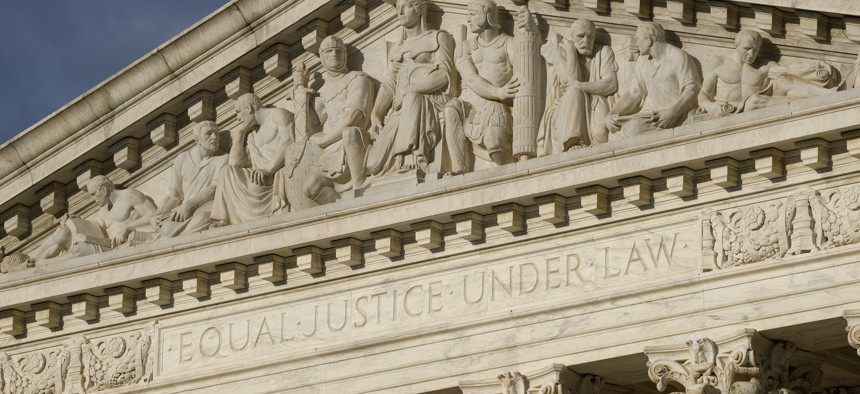Supreme Court Declines to Take Up Limits of Legal Immunity for Police

The setting sun shines on the Supreme Court building on Capitol Hill in Washington, Sunday, May 3, 2020 AP Photo/Patrick Semansky
The court decided not to consider eight cases that challenge the legal doctrine of qualified immunity, which has been used to throw out civil lawsuits about police use of force.
The U.S. Supreme Court will not review legal doctrine this term that has been used to shield police from lawsuits regarding their conduct on the job, declining Monday to hear a series of “qualified immunity” cases.
The decision comes as protests against police brutality have taken hold in cities across the country, with demonstrators urging local leaders to defund law enforcement agencies and enact laws to hold them accountable for their actions.
The court declined to take up eight cases that had challenged use of qualified immunity—a push that has been championed by legal advocates from across the political spectrum. But in a dissent filed in one of the cases, Justice Clarence Thomas wrote that he continues to have “strong doubts” about the court’s application of the doctrine and urged its review.
The Supreme Court developed the legal doctrine through a series of decisions dating back to 1967 that were meant to protect government employees from frivolous litigation. To overcome the legal burden to sue police, a person must show the officer broke a “clearly established” law, which has turned into a difficult standard in many cases.
Thomas filed the dissent in the oldest pending qualified immunity case the court was considering, which involved a burglar who surrendered to police but was then bitten by a police dog.
“There likely is no basis for the objective inquiry into clearly established law that our modern cases prescribe,” wrote Thomas in his dissent. “Leading treatises from the second half of the 19th century and case law until the 1980s contain no support for this ‘clearly established law’ test.”
Renewed scrutiny of the legal principle comes amid nationwide protests over the death of George Floyd, a 46-year-old black man, who died after a white police officer pinned the man’s neck to the ground using his knee.
Given the high court’s role in establishing the concept of qualified immunity, legal experts say the justices have a responsibility to review how it is being applied.
“Qualified immunity is a failure as a matter of law and as a matter of policy,” said Robert McNamara, a senior attorney with the libertarian Institute for Justice, which had brought one of the cases that was denied review Monday. “The court chose not to confront the problem today but that does not make the problem go away.”
If qualified immunity is restricted or done away with at some point, local governments would likely shoulder the costs associated with paying damages awarded in civil lawsuits and therefore have reason to support its continued application and use, said Lisa Soronen, executive director of the State and Local Legal Center, which files briefs with the Supreme Court that support state and local governments.
“The financial burden of getting rid of qualified immunity really falls on the employer and not the employee,” she said.
Doing away with the legal protection for law enforcement might also make it more difficult to recruit and attract officers due to the increased concern over legal liabilities, she said.
A Reuters investigation this year found that since 2005, appellate courts “have shown an increasing tendency to grant immunity in excessive force cases—rulings that the district courts below them must follow.”
Jay Schweikert, a policy analyst at the libertarian Cato Institute, called the court’s decision not to consider any of the pending cases “a shocking dereliction of duty.”
“By effectively rewriting and undermining the civil rights law that was supposed to be our primary means of holding public officials accountable, the Supreme Court shares a huge portion of the blame for our present crisis,” he wrote.
Both conservative and liberal lawmakers in Congress have introduced legislation to curtail use of qualified immunity. David Cole, the national legal director for the American Civil Liberties Union, said the decision by the Supreme Court not to wade into the issue increases the need for Congress to address it.
But U.S. Sen. Tim Scott, a Republican from South Carolina, who has spearheaded GOP negotiations with the White House on potential police reform measures this weekend said qualified immunity was “off the table.”
"From the Republican perspective, and the president has sent a signal that qualified immunity is off the table. They see that as a poison pill on our side," Scott said on "Face the Nation." "We can use the decertification of officers, except for the law enforcement unions say that's a poison pill."
Andrea Noble is a staff correspondent with Route Fifty.
NEXT STORY: Fear of Public Transit Got Ahead of the Evidence





